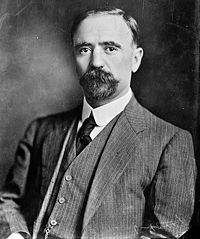Francisco I. Madero President
Francisco Indalecio Madero González (Spanish pronunciation: [fɾanˈsisko indaˈlesjo maˈðeɾo ɣonˈsales]; 30 October 1873‒22 February 1913) was a Mexican statesman, writer, and revolutionary who served as the 33rd president of Mexico from 1911 until his assassination in 1913. An advocate for social justice and democracy, Madero was instrumental in creating the revolutionary movement that began in 1910 and led to the fall of the dictatorship of then-president, Porfirio Diaz.Born into a wealthy landowning family in northern Mexico, Madero was the prototypical upper-class politician. In his 1908 book entitled The Presidential Succession in 1910, Madero called on voters to prevent the sixth reelection of Porfirio Díaz, which Madero considered anti-democratic. His vision would lay the foundation for a democratic, 20th-century Mexico but without polarizing the social classes. To that effect, he funded the Anti-Reelectionist Party (later the Progressive Constitutional Party) and incited the Mexican people to rise up against Díaz, which ignited the Mexican Revolution in 1910. Arrested by the dictatorship shortly after being declared Presidential candidate by his party, the opposition leader escaped from prison and launched the Plan of San Luis Potosí from the United States, in this manner beginning the Mexican Revolution.Following the resignation of Díaz from the presidency on 25 May 1911 after the signing of the Treaty of Ciudad Juárez, Madero became the highest political leader of the country. Known as "Maderistas", Madero's followers referred to him as the "caudillo de la Revolución" (leader of the Revolution). He was elected president on 15 October 1911 by almost 90% of the vote. Sworn into office on 6 November 1911, he became one of Mexico's youngest elected presidents having just turned 38. Despite considerable popularity amongst the people, Madero's administration soon encountered opposition both from more radical revolutionaries and from remnants of the former regime. In February 1913, a military coup took place in the Mexican capital led by General Victoriano Huerta, the military commander of the city. Madero was arrested and a short time later assassinated along with his Vice-President, José María Pino Suárez on 22 February 1913, following the series of events known as the Ten Tragic Days (la Decena Tragica). The death of Madero and Pino Suárez led to a national and international outcry which eventually paved the way for the fall of the Huerta Dictatorship, the triumph of the Mexican Revolution and the establishment of the 1917 Constitution of Mexico under maderista President Venustiano Carranza.
Search
Politician
| successor | |
|---|---|
| vice president |
